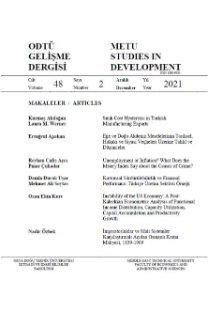Turkey vis-à-vis the periphery of the EU: An economic assessment
Bu yazının amacı, Türkiyenin son üç onyıldaki ekonomik deneyimini ABnin çevre ülkeleriyle karşılaştırarak incelemektir. Yazıda dünya ekonomisinin yaşadığı son üç orta dönemli çevrimde belli başlı ülke gruplarının başarımları değerlendirildikten sonra, 2000li yıllardaki borç-itişli çevrimin canlılık ve onu izleyen durgunluk evrelerinin incelenmesine geçilmektedir. Yazının bir sonraki bölümünde Türkiye ekonomisinin uzun dönemli gelişmesi gözden geçirilmekte ve 1980lerin başından günümüze kadar geçen uzun dönemde Türkiyenin ABnin (reel hasıla artışı itibariyle) ABnin doğu ve güneydoğusundaki çevre ülkelerine kıyasla daha başarılı olduğu kaydedilmektedir. Bununla birlikte, Türkiye 2000li yıllarda (ABnin çevresinde yer alan ülkelerdekine benzer biçimde) sanayisizleşme belirtileri göstermekte, özelleştirme ve sendikasızlaşmanın olumsuz toplumsal etkileri ile de karşı karşıya bulunmaktadır.
Türkiye ve ABnin çevre ülkeleri: Bir ekonomik değerlendirme
The aim of this paper is to review the Turkish economic experience in comparison to those countries at the periphery of the EU in the last three decades. Starting with the assessment of economic performance in major country groups over the last three medium- term cycles of the world economy, the paper then proceeds to the examination of debt-led boom and the subsequent recession in that periphery over the 2000s. In the following section, Turkish economic development over the long run is reviewed and it is noted that, from the early 1980s to the present, Turkey had a better record of output growth vis-à-vis the Eastern & South Eastern periphery of the EU. However, Turkey has recently started to show signs of deindustrialisation and has also been faced with some adverse social consequences of privatisation and deunionisation similar to what has been observed in the periphery of the EU.
___
- AKOĞLU-ŞİŞMAN, M. (2014), East European Countries and Turkey vis-à-vis the EU: A Comparative Analysis of Commercial Relations, in this issue of METU Studies in Development.
- AMECO Database (access: April 2014).
- AYGÜL, C. (2014), Financial Crisis in Southern Europe in Comparison with Eastern Europe, in this issue of METU Studies in Development.
- BORATAV, K. (2009), The Turkish Economy at the Rising Stage of a Global Cycle, in N. Mütevellioğlu and S. Sönmez (eds.), Globalisation, Crisis and the Neoliberal Transformation in Turkey, İstanbul: Bilgi Üniversitesi (in Turkish).
- BORATAV, K. et al. (1998), An Economic Assessment of the Turkish SOE System: Quantitative Analysis, Problems of Privatisation and Policy Options, Research Report, Ankara: KİGEM (in Turkish).
- ÇELİK, A. (2013), Unions and Deunionisation in the First Ten Years of the AKP Rule, Perspectives/ Political Analysis and Commentary from Turkey, Heinrich Böll Stiftung/Turkey Representation, 3, 44-8 (in Turkish).
- ÇELİK, A. and LORDOĞLU, K. (2006), On the Problems of Official Statistics concerning Unionisation, Çalışma ve Toplum, 9, 11-29 (in Turkish). EC. europa.eu/enlargement (access: April 2014).
- GRABEL, I. (1995), Speculation-Led Economic Development: A Post-Keynesian Interpretation of Financial Liberalization Programmes in the Third World, International Review of Applied Economics, 9 (2), 127-49.
- GRABEL, I. (1996), Marketing the Third World: The Contradictions of Portfolio Investment in the Global Economy, World Development, 24 (11), 1761-76.
- IMF/WEO Database (access: April 2014).
- INTERNATIONAL LABOUR OFFICE / INTERNATIONAL INSTITUTE FOR LABOUR STUDIES (ILO/11LS) (2012), World of Work Report 2012: Better Jobs for a Better Recovery, Geneva: ILO.
- ISSA (Independent Social Scientists Alliance) (2006), Turkey and the IMF: Macroeconomic Policy, Patterns of Growth and Persistent Fragilities, Penang, Malaysia: Third World Development Network.
- KALKINMA BAKANLIĞI, Annual Programmes, various issues.
- KRŽAN, M. (2014), Crisis in Slovenia: Roots, Effects, Prospects, in this issue of METU Studies in Development.
- MIHALJEVIĆ, D. (2014), The Political Framework of Industrial Meltdown in Croatia, 1990- 2013, in this issue of METU Studies in Development.
- MUSIĆ, G. (2014), Serbia's Protracted Transition Under State-Led and Neoliberal Models of Capitalist Development (1988-2008), in this issue of METU Studies in Development. NATO.int/eps/en/natolive/topics (access: April 2014).
- SHIRLEY, M. (1999), Bureaucrats in Business: The Roles of Privatization versus Corporatization in State-Owned Enterprise Reform, World Development, 27(1), 115-36.
- STOCKHAMMER, E. (2012), Rising Inequality as a Root Cause of the Present Crisis, PERI Working Papers Series, 282.
- Turkstat Database (access: April 2014).
- TÜREL, O. (2001a), Restructuring the Public Sector in Post-1980 Turkey: An Assessment, in H. Hakimian and Z. Moshaver (eds.), The State and Global Change: The Political Economy of Trunsition in the Middle East and North Africa, Richmond: Curzon.
- TÜREL, O.(2001b), A New Legal Framework to the Central Bank of Turkey: An Assessment on the Law Nr. 4651, Mülkiye, XXV (229), 71-86 (in Turkish).
- YELDAN, A. E. (2009), Patterns of Adjustment under the Age of Finance: The Case of Turkey as a Peripheral Agent of Neoliberal Globalization in C. P. Chandrasekhar and J. Ghosh (eds.), After Crisis, New Delhi: Tulika Press.
- ISSN: 1010-9935
- Yayın Aralığı: Yılda 3 Sayı
- Başlangıç: 2018
- Yayıncı: ODTÜ İİBF
